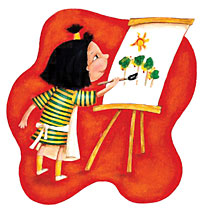 Schools program us to think and act in certain acceptable ways. They prepare us to fit in society like pieces of a jigsaw puzzle. But the process in which they do so differs from place to place. This difference becomes particularly striking if you are looking at a school in another culture. And if the other culture happens to be a wealthy preschool in the US, the contrast strikes you harder.
Schools program us to think and act in certain acceptable ways. They prepare us to fit in society like pieces of a jigsaw puzzle. But the process in which they do so differs from place to place. This difference becomes particularly striking if you are looking at a school in another culture. And if the other culture happens to be a wealthy preschool in the US, the contrast strikes you harder. The classroom is spacious, colourful, fully equipped. There is a head teacher and two assistant teachers for 15 kids bursting with energy. As one of the assistant teachers when four-year-old Jason pulls your hair to play horse, you can't just get up and yell at him. You must request him in a singsong voice, "Jason, please stop pulling my hair. Nice boys don't act like that." To your Nepali ears, this sounds hyper civilised and artificial. Because back home, little boys don't dare come near their teacher, let alone pull her braid. If they do, they get a nice beating.
When Amanda's paper frog looks like a boat and you offer to help her, the head teacher calls you to a corner and says, "I would suggest letting Amanda make her own frog. As a teacher, you are supposed to watch them do their thing." Your urge to instruct is too strong to accept a boat as a frog but you quietly suppress it. You cannot go against their philosophy. Teachers back home didn't go against a philosophy because they didn't have one.
Two boys suddenly turn wild and start destroying each other's Lego ships. In your newly acquired singsong, you request them to stop but they are unstoppable. As the scene grows violent, you loudly threaten to cancel their outing. The head teacher comes and warns you against using 'negative speech' and demonstrates the right way to handle the situation. She summons both parties, hears them out and ponders long before she recommends a solution. A mini trial, her effort looks extravagant to you. You never received such treatment as kids although you belonged to the privileged lot.
As Eric squeezes out full tubes of paint to make his 'art', you suggest he could do better with less. "No," he says haughtily. "I like it this way!" The head teacher standing nearby smiles and asks you to let him be. "It's never a waste as long as they're exploring their imagination." The sheer abundance of the classroom's resources dazzles you. But the freedom with which the children can exploit them dazzles you even more. Then you remember how throughout your childhood, your parents stacked all your toys on a high shelf because you might damage them.
Finally, when it's time to go home, you marvel at the ease with which the kids ask you to find their things, tie their laces, button their coats. Some just want you to sit with them and listen as they talk. They are bright, cheery and adorable, as children are. But here they know what they are entitled to. They question, demand and complain like no kid in your hometown does. At three and five, their idea of self-importance has already taken a firm shape. Freedom, security and comfort are already a natural condition for them. And they know how to react to the slightest disruption.
In another classroom, where you are a student again, your professors constantly complain about your silence. They want you to be like your American classmates, who express even the most rambling thought with great confidence. They want you to be vocal, analytical and assertive. You need to have an opinion on everything. You need to speak up, interact and participate more. Now, you can make sense of their demand. You can also make sense of your resistance to it. Your differences are deeper than you thought.



